Social-emotional
learning for kids
Interactive story-driven games and courses for developing social and emotional skills in kids 6-13 years old.
TRY DEMO NOW FOR FREE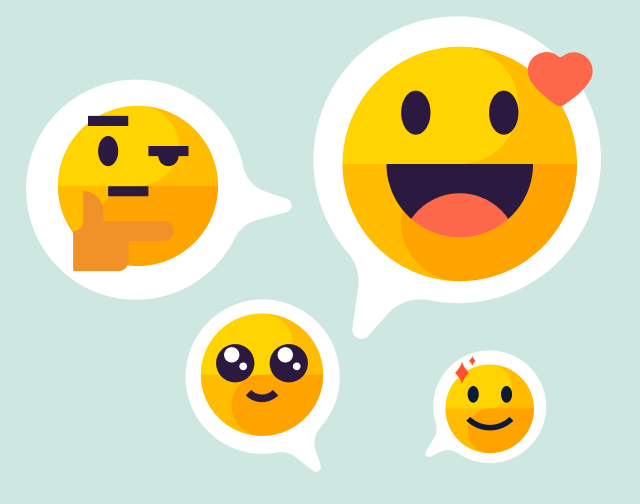
What is SEL?
Social-emotional learning (SEL) is a special mindset that enables a person to successfully achieve goals, managing his or her emotions, establishing healthy relationships, and making wise, rational choices. SEL contains five components:
Self-Awareness
Self-awareness involves recognizing your emotions, principles, and aims. It also helps you find out your strengths and weaknesses and leads you toward objective and adequate self-esteem. This can make you feel confident about yourself and give you a positive outlook even in stressful and crisis periods.
Self-Management
Self-management teaches you to control your thoughts and emotions in different situations. This includes dealing with stress and impulsive reactions, as well as setting realistic goals and overcoming challenges to achieve them. It also enables you to apply different stress management strategies according to the situation.
Social Awareness
Social awareness is an ability to recognize social norms for behavior in various communities and react positively to those different from what you are used to. It involves showing empathy and acting in an ethical manner when communicating with people from different backgrounds or cultures.
Relationship Skills
Relationship skills enable you to build and maintain healthy relationships with people of different cultures and backgrounds. It includes such skills as active listening, cooperating, conflict resolution, offering, and asking for help. This component focuses on acting in accordance with social norms in order to achieve communicative goals.
Responsible Decision Making
Responsible decision making lets you constructively choose how to act or respond in various situations according to standards of ethics, safety rules, behavioral norms for risky cases, the health and well-being of self and others. It helps you to analyze every unique life occurrence and to select the best behavioral pattern.
What are the benefits of SEL for children?
Healthy communication
Socially and emotionally complete children find it easy to make friends and resolve any conflict peacefully, without being rejected or isolated.
Prevention of bullying
Children with a high level of social-emotional skills are more likely to avoid being bullied in school, as well as acting aggressively toward their peers.
Better academic performance
Children's social-emotional competence affects their academic performance and decreases major disciplinary incidents due to the developed empathy.
Happy and successful life
In the long run, greater social and emotional awareness leads to career success, healthy working, and personal relationships and reduces criminal behavior.
Edcraft provides interactive games and courses on SEL for kids
Every parent wishes for his or her child to be healthy and competitive in all areas of life. Social-emotional learning is a major component of present and future success. Our SEL course will help your kid develop crucial soft skills and communicate with the outer world without difficulties. The course consists of the following units:
Getting to know emotions
This course is created for children 6-13 years old. It gives them the necessary basics of emotional intelligence learning. 10 lessons, which have a form of a situational game, provide kids a fundamental understanding of human emotions, feelings of other people and their own. Interactive courses with extra tasks and fun quizzes enable a child to research the topic thoroughly and with a huge interest simultaneously.
Conflict resolution
The target audience of this course is children 7-13 years old. In the interactive game, a kid learns to give advice, make decisions and cope with the consequences. Through 40 exciting interactive tasks integrated into the story, you will review most of the conflict scenarios which are likely to occur with a child in early and teen age. Approximately 5 hours of lessons in game format will help you to find out how to act in different situations and when it is necessary to ask somebody for help.
Personality types
This unit is aimed at children 6-13 years old. It explains to kids that there are lots of various characters in the world, and we can find a way to communicate with all of them. This unit will show a child that most people have something in common and something unique at the same time. By the end of the course, a kid will have learned how different people make decisions, why it is hard for some folks to make friends, and what affects our day-planning routine.
Teamwork
This course is suitable for children between 8 and 14 years old. It is designed in the format of a situational game which is divided into 10 lessons, 30-40 minutes each. During this unit, a kid is getting acquainted with the basic principles of teamwork, including an ability to recognize the strong sides of each team member and the skill of giving and receiving objective and constructive feedback. An exciting quiz at the end of the course gives a child an opportunity to check if the material is clearly understood.
Try EdCraft social-emotional learning course for free
SEL for kids course demo
Check out our story-driven interactive games that your kids will face in our social-emotional learning courses. It takes only 10 minutes.
Free of charge. No signup required!
Learn the social skills of the future with EdCraft!
Emotion recognition
Emotion management
Empathy
Communication
Assertiveness
Impulse control
Calming down
Problem solving
Decision making
Setting goals
Team work
Conflict resolution
Through situational games children acquire skills vital for success in school, at work and in life
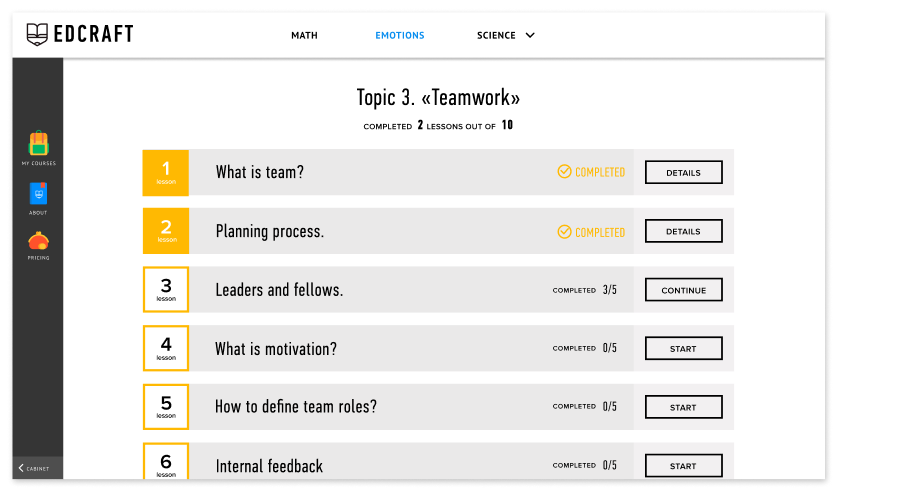
SOPHISTICATED PROGRAM
Units are developed on the basis of the best sources, the expertise of methodologists and psychologists, divided into 10 lessons with gamified tasks
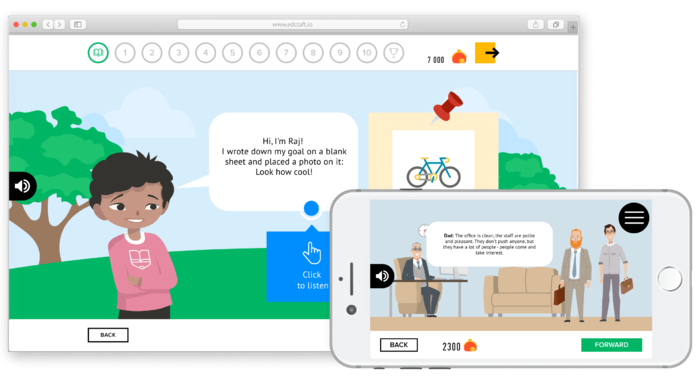
INTERACTIVE GAME STURCTURE
The child solves plot game problems to learn new topics and consolidate what he has learned in each course. No boredom! All the tasks are unique!
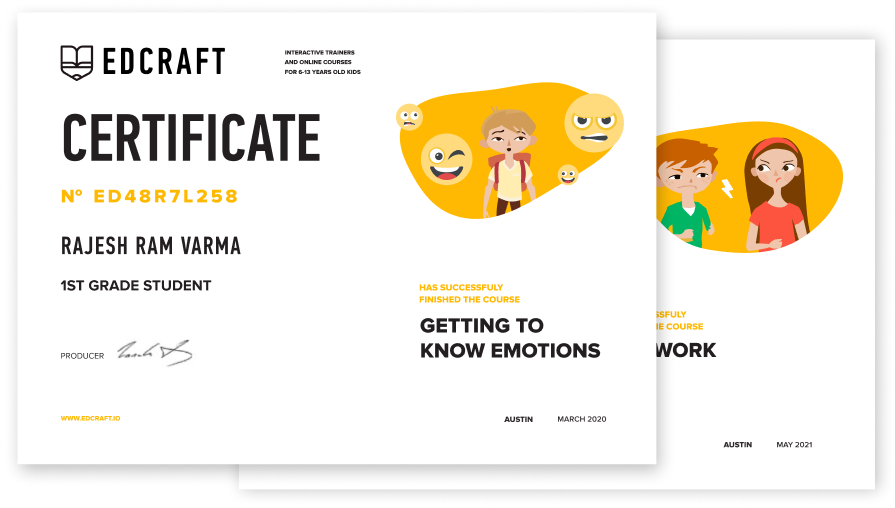
KNOWLEDGE TESTS AND REWARDS
At the end of each course, the child takes a test or completes a game, receiving a diploma if successful. You will be confident in your kid’s knowledge!
On our social & emotional learning courses kids solve tricky social puzzles based on real life situations
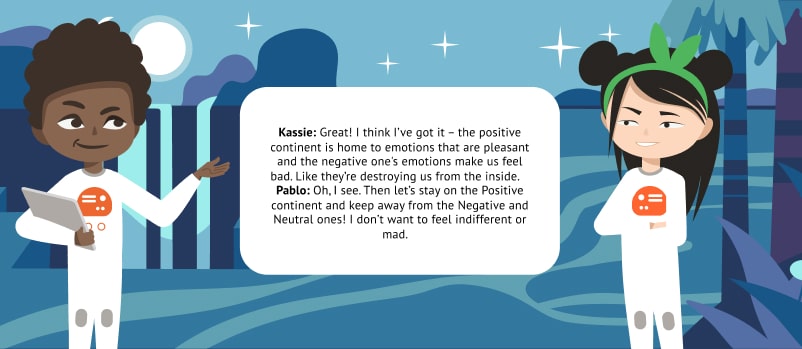
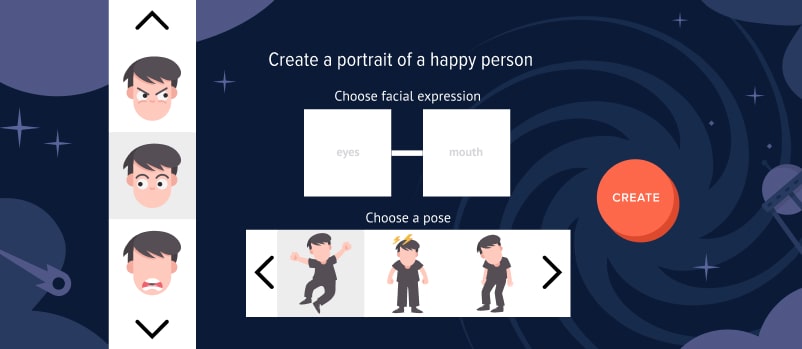
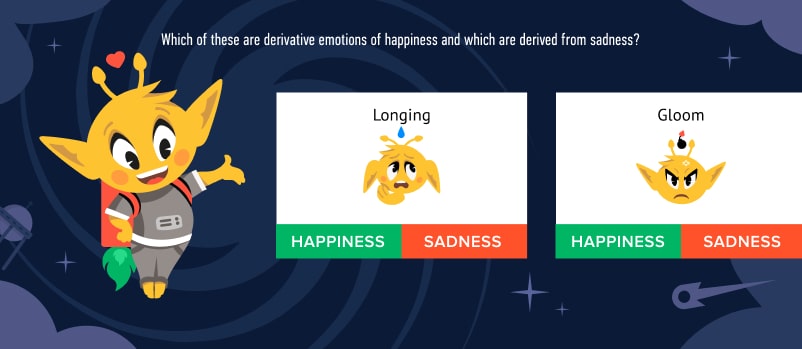
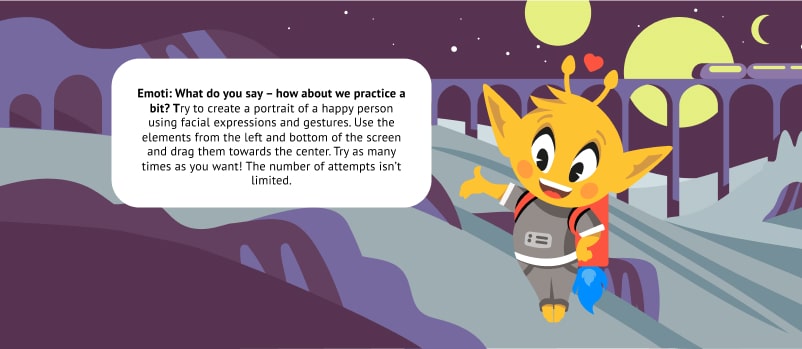
Crucial research outcomes for SEL
20% decrease of bullying of disabled students
20% sensible reading improvement
13% increase in academic performance
18% improvement in making friends
Frequently asked questions about SEL
What is social and emotional learning?
Social-Emotional Learning (SEL) is a special mindset that enables a person to successfully achieve goals, managing his/her emotions, establishing healthy relationships, and making wise, rational choices. SEL contains five components: self-awareness, self-management, social awareness, relationship skills, and responsible decision making. It is a significant part of education and human development. SEL is about getting a pack of soft skills and applying it to develop a healthy personality, set and achieve goals and establish lasting supporting relationships with people around.
Why is SEL important?
Nowadays, soft skills are a foundation for thriving in life. SEL is a powerful tool to achieve success at school and in personal life as it leads to better academic performance, fewer disciplinary incidents, mental strength, and a stable emotional state. Children who are socially and emotionally developed find it easy to make friends and resolve any conflict peacefully, without being rejected or isolated. This helps them to avoid being bullied in school, as well as acting aggressively toward their peers. It also develops such a valuable skill as empathy which leads to healthy working and personal relationships.
What can parents do to promote their child’s SEL?
Parents should develop a closer bond with their children and maintain a supportive, positive relationship built on social and emotional awareness. In other words, the best thing for parents to do is to develop their own emotional intelligence in order to transfer this knowledge to their kids and set a favorable environment for SEL. Moreover, there are some social-emotional activities for children that you can practice in order to reinforce everything learned on SEL courses or at school. For example, you can offer your kid to solve a hypothetical conflict between his/her favorite cartoon characters.
How can Edcraft help in SEL comprehension?
Our SEL course will help your child to cope with the difficulties which can appear during social interaction. The course consists of 4 units: getting to know emotions, conflict resolution, personality types, and teamwork. It is a perfect mixture of playing and learning as all of the units are designed in a game form. A child is to help different characters solve some vital issues, including problems with self-confidence, communication with people of different backgrounds, and taking leadership. All of the cases are based on the real situations which are most likely to occur in the child's life.
What else do we have in EdCraft?
Complete by yourself or together with your kid. It's fun, educational and takes only up to 10 minutes for the demo lesson.

MATH & LOGIC
develop a mathematical mind through game like exercises

CHEMISTRY BASICS
explore the world of particles through gamified experiments

PHYSICS BASICS
learn in a simple way how objects and forces interact

FINANCIAL LITERACY
getting familiar with managing money in a fun way

SEX EDUCATION
topics covering relationships without awkwardness
